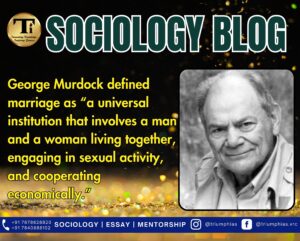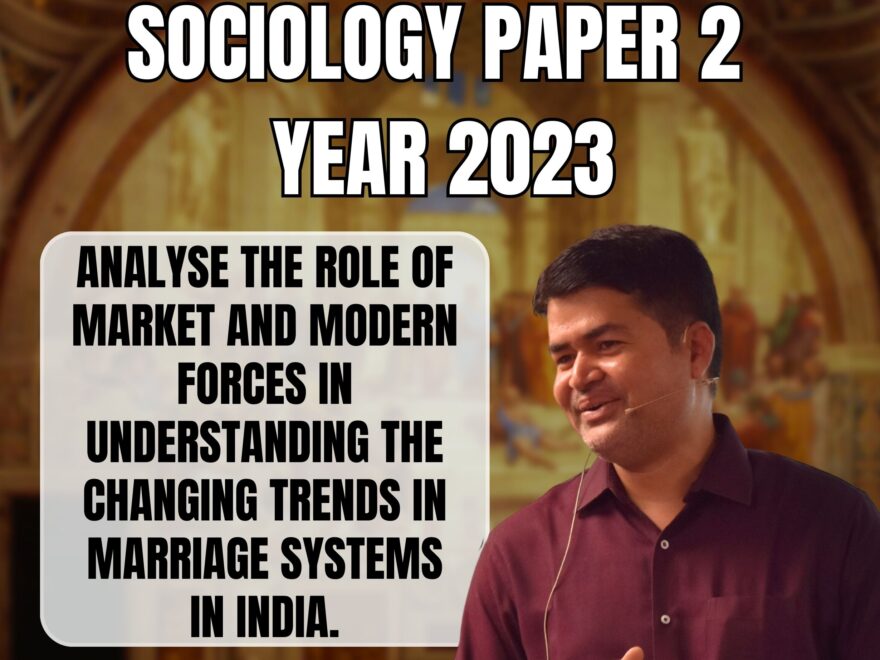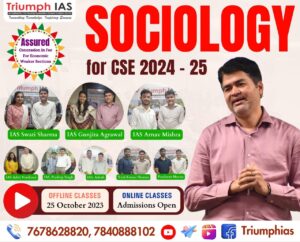Analyse the role of market and modern forces in understanding the changing trends in marriage systems in India
Section: A.
Sociology Paper 2023 Analysis.
Relevant for Paper 2: Unit-12 Social Structure

Question 2 (c): Analyse the role of market and modern forces in understanding the changing trends in marriage systems in India.
(10 Marks)
|
Introduction: Explain the Classical Notion of Marriage Main Body: Explain Role of Modern Forces and Market on Marriage Highlighting New Patterns Conclusion: On the lines that Even Changes are There but Marriage Still Continues to Exists as a Significant Institution. |
Introduction:
Malinowski defines marriage as a contract for the production and maintenance of children.According to classical notion of marriage as defined by Horton and Hunt is the approved social pattern whereby two or more persons establish a family. However due to market and modern forces marriage has also changed in its essence, structure, and functions as well as meanings and orientation.
Main body:
Changes in marriage due to change in Market Forces
- In traditional marital alliance, wife had no voice in family decision-making. In contemporary families, the wife now plays an equal role in budgeting family expenses, disciplining children, making purchases, and giving gifts, asserting herself as an equal partner in these aspects of family life. The assumption of economic role and the education of wife have made wives potential equals.
- Many individuals are choosing to delay marriage until later in life. Economic factors, such as pursuing higher education and establishing a career, have led people to postpone marriage.
- With economic independence of people, now love marriage is also seeing increasing trend.
- Also with economic independence of both married partner family marital breakdown has become easier, divorce rate is higher in double income no kid families.
- Also, instead of the samskara of the girl and the reputation of the groom’s family, resource mobilisation capacity of both is becoming criterion for mate selection.
- Market forces also promote consumerism and materialistic culture. Due to this , conspicuous consumption in marriage ceremonies such as destination weddings in five star palatial hotels of Udaipur.
- In some societies, there has been a decline in marriage rates. Factors such as economic instability, changing gender dynamics, and a greater emphasis on individualism have contributed to this trend. Many individuals are opting for alternative lifestyles, choosing to remain single or engage in long-term partnerships without formal marriage.
Role of forces of Modernity:-
- The emphasis on individual fulfilment and personal happiness has increased, impacting the institution of marriage. People are seeking partners who can support their personal growth and goals, and are less willing to settle for unhappy or unsatisfying relationships. This trend highlights the shift towards more egalitarian and companionate marriages.
- Technology has had a significant impact on marriage and family dynamics. Social media, dating apps, and online platforms have altered the way people meet, form relationships, and maintain connections. These technological advancements have expanded.
- Life is becoming more and more secular, marriage is no longer a sacrament, but a personal affair.According to Nicky Hart opportunities to escape marriage are more today and divorce is no longer social stigma.
- According to Karve, dowry is becoming more entrenched and prices of groom are increasing with education.
- Legal restrictions on polygamous marriage have led to emancipation of women. This trend towards monogamy has transformed the intimacies and individual preferences for marriage.Legal rational transformation of marriage through Court marriage, now it is becoming mere a contract that is dissoluble.
- Modernity contributes to liberty in mate selection beyond one’ caste, religion, class or ethnicity. This contributes to the emergence of Inter religious/ caste/ state/ ethnicity marriages. Values of Liberty and individuality also give rise to live-in relationships.
- Modernity also promotes secularisation. It contributes to Contractualisation of marriage and divorces and serial monogamy. Modern values also promote ideology of acceptance of homosexual identity or fluid sexual identities. It promotes same sex marriages.
Conclusion:
In the ever-evolving landscape of Indian society, market forces and modernity have undoubtedly reshaped the contours of marriage. The institution has witnessed transformations in its structure, roles, and meanings. However, amidst these changes, marriage persists as a significant and enduring societal institution, reflecting both tradition and adaptation to contemporary influences.
Related Blogs…
 |
 |

To master these intricacies and fare well in the Sociology Optional Syllabus, aspiring sociologists might benefit from guidance by the Best Sociology Optional Teacher and participation in the Best Sociology Optional Coaching. These avenues provide comprehensive assistance, ensuring a solid understanding of sociology’s diverse methodologies and techniques.
META TAGS:
Iron Law of Oligarchy, Robert Michels, Vilfredo Pareto, Lions and Foxes theory, power dynamics, organizational oligarchy, elite circulation, political sociology, leadership styles, organizational control, sociological theories, political maneuvering, elite differentiation, power concentration, societal stability, political leadership, strategic political leadership, Sociology Question Paper, Sociology Question Paper 2023, Sociology Question Paper CYQ, Sociology Question Paper UPSC, What, according to Robert Michels, is the iron law of oligarchy? Do lions and foxes in Vilfredo Pareto’s theory, essentially differ from each other? Substantiate.
Why Vikash Ranjan’s Classes for Sociology?
Proper guidance and assistance are required to learn the skill of interlinking current happenings with the conventional topics. VIKASH RANJAN SIR at TRIUMPH IAS guides students according to the Recent Trends of UPSC, making him the Best Sociology Teacher for Sociology Optional UPSC.
At Triumph IAS, the Best Sociology Optional Coaching platform, we not only provide the best study material and applied classes for Sociology for IAS but also conduct regular assignments and class tests to assess candidates’ writing skills and understanding of the subject.
Choose The Best Sociology Optional Teacher for IAS Preparation?
At the beginning of the journey for Civil Services Examination preparation, many students face a pivotal decision – selecting their optional subject. Questions such as “which optional subject is the best?” and “which optional subject is the most scoring?” frequently come to mind. Choosing the right optional subject, like choosing the best sociology optional teacher, is a subjective yet vital step that requires a thoughtful decision based on facts. A misstep in this crucial decision can indeed prove disastrous.
Ever since the exam pattern was revamped in 2013, the UPSC has eliminated the need for a second optional subject. Now, candidates have to choose only one optional subject for the UPSC Mains, which has two papers of 250 marks each. One of the compelling choices for many has been the sociology optional. However, it’s strongly advised to decide on your optional subject for mains well ahead of time to get sufficient time to complete the syllabus. After all, most students score similarly in General Studies Papers; it’s the score in the optional subject & essay that contributes significantly to the final selection.
“A sound strategy does not rely solely on the popular
Opinion of toppers or famous YouTubers cum teachers.”
It requires understanding one’s ability, interest, and the relevance of the subject, not just for the exam but also for life in general. Hence, when selecting the best sociology teacher, one must consider the usefulness of sociology optional coaching in General Studies, Essay, and Personality Test.
The choice of the optional subject should be based on objective criteria, such as the nature, scope, and size of the syllabus, uniformity and stability in the question pattern, relevance of the syllabic content in daily life in society, and the availability of study material and guidance. For example, choosing the best sociology optional coaching can ensure access to top-quality study materials and experienced teachers. Always remember, the approach of the UPSC optional subject differs from your academic studies of subjects. Therefore, before settling for sociology optional, you need to analyze the syllabus, previous years’ pattern, subject requirements (be it ideal, visionary, numerical, conceptual theoretical), and your comfort level with the subject.
This decision marks a critical point in your UPSC – CSE journey, potentially determining your success in a career in IAS/Civil Services. Therefore, it’s crucial to choose wisely, whether it’s the optional subject or the best sociology optional teacher. Always base your decision on accurate facts, and never let your emotional biases guide your choices. After all, the search for the best sociology optional coaching is about finding the perfect fit for your unique academic needs and aspirations.
Follow us :



Find More Blogs…
| Compare and contrast Karl Marx’s and Max weber’s | Karl Marx- Historical Materialism |
| Position of Women In the Modern Indian Society | Sociology: Social system and pattern variables |




One comment